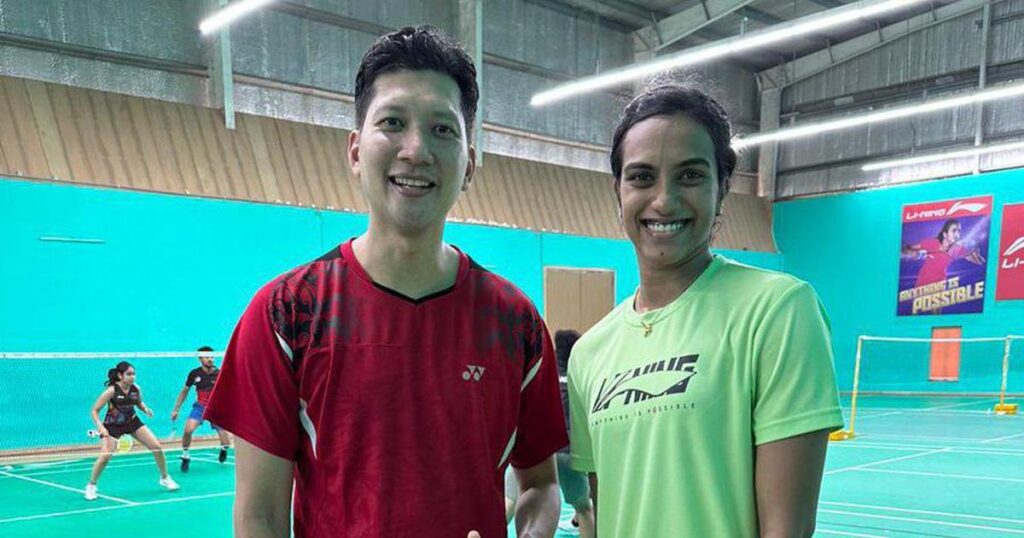
Korea Open – Lost in the round of 32. US Open – Lost in the Quarterfinals. Canada Open – Lost in the semi-finals. Indonesia Open – Lost in the Round of 16. Singapore Open – Lost in the Round of 32. Thailand Open – Lost in the Round of 32. Malaysia Masters – Lost in the semi-final. All England Championships – Lost in the Round of 32. Swiss Open – Lost in the Round of 16.
PV Sindhu’s report card for this year makes for sorry reading indeed. In the last few months, she hasn’t just been losing to her nemeses – Tai Tzu Ying or An-Se-Young – but also finding it difficult to beat players against whom she is expected to win. Let it be Pai Yu-Po, Gao Fangjie, Mia Blichfeldt or Putri Kusuma Wardani, Sindhu has hurtled to losses.
So much so that after being in the top 10 for more than 350 weeks, she found herself outside the top 10 in the singles rankings in April this year. As Sindhu continues to slip further in the rankings, the group of Young, Tai, Akane Yamaguchi and Chen Yufei continue to pull away from the rest of the field. With just over a year left for the Paris Olympics to begin, Sindhu has to navigate her way back into the top 10 of rankings and also bridge the considerable gap that seems to exist between herself and those top players.
So what has gone wrong with the golden girl of Indian Badminton? How can she resurrect her fortunes? It is difficult to join the dots and imagine one single pattern for her slide in the rankings. But there could be a few reasons, which have led to her downfall. Perhaps she tends to play a game according to her opponent’s strategy? To find more evidence for this, just hit the rewind button and watch parts of her straight-sets loss against Tai in the Indonesian Open.
At 5-2 in the first game, Sindhu was forced into long rallies with Tai employing high tosses and cross-court drops. Ultimately, Sindhu tried the smash against one of those high tosses and ended up finding the net. At 8-4, Sindhu’s defensive skills were again tested, with Tai winning the point through her famed and deceptive drop-shot. There were a few rallies where Sindhu held the ascendancy and killed the point with her smash. But it was crystal clear that the Taiwanese prodded and prodded Sindhu by using high tosses, half-smashes and net play, and bagged a slew of points.
Incidentally, a couple of years ago, Park Tae-Sang, her former coach, had shared his insights about Sindhu’s weakness just before the Tokyo Olympics. Here, it has to be noted that Sindhu did showcase some fine defensive skills in the mega-event, especially in the Quarter-final against Yamaguchi, who herself is an acclaimed retriever.
“Sindhu’s defence is weak compared to her attack,” Park had said. “So I have been focussing on her defence training before the Olympics. I know a lot of people felt there was something wrong with her physical strength when she lost in the Thailand Open, but it wasn’t so. She reached the Swiss final, and the All England semi-final and fitness has not been a problem.
“Her defence was the one only problem. (Carolina) Marin and Pornpawee (Chochuwong) are good attacking players, they were using a lot of half-smash and straight smash, and when Sindhu’s defence goes down on a day, it affects her other skills as well, and she gets nervous. But now she has improved a lot in her defence as well. Her endurance on the court is also good.”
At her best, Sindhu is renowned for her fast-paced and attacking game. Standing at 5’11”, she has got tremendous reach and the incandescent light of her game is obviously the smash. But her current game is mostly strewn with errors, and she is struggling to return low shuttles at the net. Simply put, she needed a coach who would help her to piece together the jigsaw puzzle, where she can blend her attacking game with some defensive skills, and reduce errors.
Muhammad Hafiz Hashim, the former All England champion, her new coach, is perhaps the right candidate for the job. The memories of his All England triumph in 2003 against Chen Hong are vague. While watching highlights from the final two decades ago, it could clearly be seen that the tall Hashim was using his height advantage to great effect against the former World No.1. He also seemed to be making the most of any half-chance that he ended up getting from his formidable opponent.
Those key strengths of Hashim would perhaps help Sindhu to carve out the right path, as the foundation of her game is based on attacking play. “After a long, drawn-out process, I am ecstatic to declare that I have chosen the incredible Hafiz Hashim as my coach,” Sindhu wrote on Twitter. “Hafiz possesses all the traits I was seeking in a coach, including height, speed, and an attacking instinct.
“As a former all-England champion in 2003, he sure has the pedigree as well. Having coach Sidek as his old coach, just add this aura to him. I extend a warm welcome aboard, Coach Hashim. Buckle up folks, it’s going to be a hell of a journey with captain Hafiz at the helm!”
To throw in a word or two of caution, it would need time for the new coach to understand the dynamics of Sindhu’s game, and also gauge her current mental state. So it is not right to expect instant results. But there is no harm in dreaming. Who knows? Perhaps, next year, we could see Sindhu on the Olympic podium for the third time.
Also Read: Satwik and Chirag can Dominate Badminton like Federer, Nadal and Djokovic did Tennis: Gopichand



